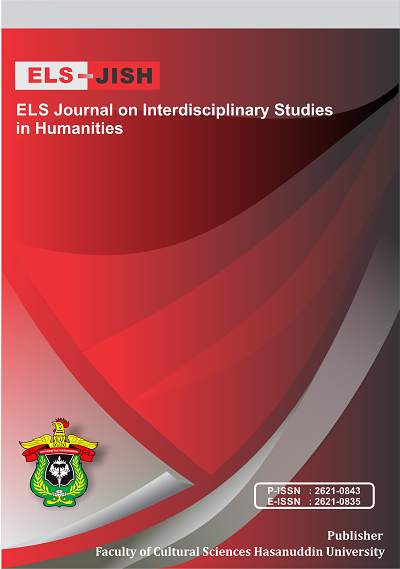The Reationship Between Toxic Parenting And Emotional Behavior of Adolescent Children in Class XI at SMAN 1 Merapi Barat
DOI:
https://doi.org/10.34050/elsjish.v7i3.36634Keywords:
Toxic Parenting, Behavior, Emotional Behavior, Emotions, Adolescents, ParentingAbstract
Adolescence is a period of child development towards the adult phase where emotional behavior is still changing and a period of self-discovery. At this time adolescents must be able to control emotions and get good parenting support. The purpose of the study was to explain empirically and theoretically the relationship between toxic parenting and the emotional behavior of adolescents in class XI at SMAN 1 Merapi Barat. Researchers used quantitative methods with simple random sampling techniques with a sample population of 119 with an age range of 16-18 years. Data analysis was carried out using statistical tests, the measuring instruments used were the emotional behavior scale and the toxic parenting scale. The results showed that there is a very significant relationship between toxic parenting and emotional behavior of adolescent children with a correlation value of R = 0.759 with a Rsquare value = 0.576 P = 0.000 (P < 0.01). The amount of effective contribution given by the toxic parenting variable to emotional behavior is R2 = 0.576 (57.6%). So there are still 42.4% of the influence of other factors related to emotional behavior.
References
Basuni, A. (2021). The relationship of parenting patterns to emotional behavior: Implications for guidance and counseling programs. Journal of Educational Counseling, 15(3), 123-135.
Chairunnisa, A. (2021). Emotional behavior in adolescents: Understanding expressions and regulation. Journal of Psychological Development, 18(2), 45-57.
Chairunnisa, A. (2021). The influence of toxic parenting on early childhood emotional behavior. Journal of Child Development, 18(2), 45-57.
Devita, R. (2020). Factors influencing emotional behavior in adolescents. Journal of Adolescent Studies, 9(3), 101-110.
Fitriyani, N. (2019). The role of positive parenting in building children's confidence. *Journal of Family Psychology, 12*(4), 203-215.
Goleman, D. (1995). Emotional intelligence: Why it can matter more than IQ. Bantam Books.
Hamdanah, D. (2022). Parenting styles and their impact on emotional development. Journal of Child Psychology, 12(4), 203-215.
Heffen, D. (2020). Data analysis and interpretation in psychological research. Psychology Research Methods, 25(1), 34-45.
Hutajulu, M. (2020). Emotional development in adolescence: The role of self-perception. Journal of Developmental Psychology, 14(3), 98-105.
Rahman, F., & Lewa, I. (2021, November). The Potential of Children’s Literature in Educatioan and Environmental Ethics: Linguistic and Literary Approaches. In The 1st International Conference on Research in Social Sciences and Humanities (ICoRSH 2020) (pp. 1054-1058). Atlantis Press.
Junaid, S., Dalyan, M., Rasyid, M. A. N., & Yamiin, M. A. (2024). Unveiling the Structural Layers: An Interpretation of Kath Walker's' A Song of Hope. Journal of Ecohumanism, 3(3), 781-797.
Kartikasari, T. (2023). The impact of toxic parenting on children's emotional regulation. Journal of Emotional and Behavioral Sciences, 15(2), 67-81.
Lanta, J., Rahman, F., Lewa, I., & Akhmar, A. M. (2022). Respect for Nature in Indonesian Children’s Fiction: Ecocriticism Perspective. Webology, 19(1), 6010-6021.
Latipah, S. (2014). Assumption testing in behavioral research. Journal of Research Methodology, 17(1), 56-64.
Maharani, F., Nurmala, L., & Pratama, D. (2022). Positive parenting and its influence on child development. Journal of Parenting Studies, 19(1), 134-149.
Muniroh, R., & Siregar, A. (2024). Toxic parenting and its effects on adolescent emotional expression. Journal of Adolescent Psychology, 20(1), 89-104.
Nikmatus, A., Nur, M., & Kartika, D. (2023). The impact of toxic parenting on adolescent emotional and psychological well-being. Journal of Family Psychology, 28(1), 82-96.
Noval, Y., & Sari, M. (2021). The role of negative communication in shaping adolescent emotional behavior. Journal of Family Communication, 13(3), 156-172.
Pollard, J. (2021). Impact of derogatory communication on adolescent self-esteem. Journal of Child and Adolescent Development, 17(2), 89-98.
Rianti, S. (2022). Parenting styles and their implications on child emotional development. Journal of Developmental Psychology, 18(3), 102-115.
Sarasati, P., Hakim, R., & Syamsul, T. (2021). Emotional intelligence and its role in adolescent self-regulation. Journal of Emotional and Behavioral Sciences, 15(2), 67-81.
Shiphy, T. (2020). Understanding adolescence: A period of identity formation. Journal of Developmental Stages, 22(3), 120-131.
Sugiyono, P. (2017). Quantitative research methods: A comprehensive guide. Bandung: Alfabeta.
Suma, M., Rahman, F., Dalyan, M., Andini, C., & Wajadi, A. M. F. (2024). Cultural Aspects of Character Education found in Comic" Pelayaran Ke Dusung": An Ecranization through the Application of Augmented Reality. Journal of Ecohumanism, 3(4), 739-753.
Suprobo, B. (2023). Toxic parenting: Causes, consequences, and interventions. Journal of Family and Child Studies, 10(2), 134-149.
Yaumi, M. T. A. H., Rahman, F., & Sahib, H. (2023). Exploring WhatsApp as Teaching and Learning Activities during Covid-19/New Normal era: A Semiotic Technology Analysis. International Journal of Current Science Research and Review, 6(12), 7627-7634.
Youngsun, K., Sosrohadi, S., Andini, C., Jung, S., Yookyung, K., & Kyeong Jae, P. (2024). Cultivating Gratitude: Essential Korean Thankfulness Phrases for Indonesian Learners. ELS Journal on Interdisciplinary Studies in Humanities, 7(2), 248-253. https://doi.org/10.34050/elsjish.v7i2.34881
Downloads
Published
Issue
Section
License
Copyright (c) 2024 Reza Nur Kholifah, Itryah Itryah

This work is licensed under a Creative Commons Attribution-ShareAlike 4.0 International License.






